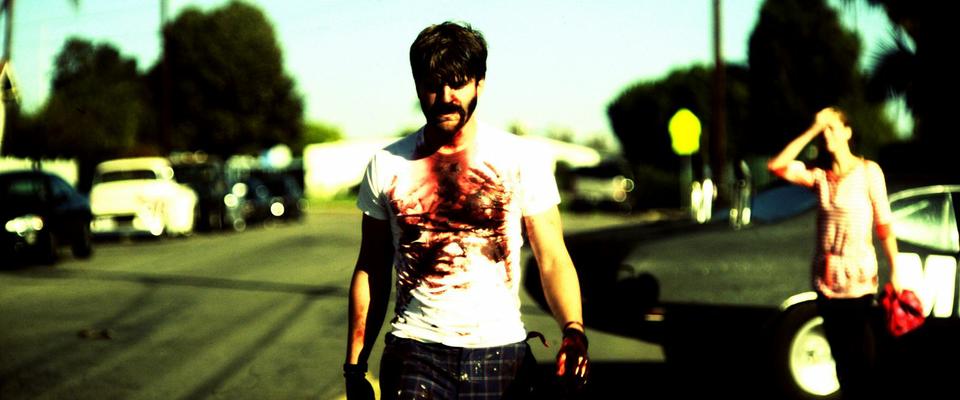
News
When Professors Speak Out, Some Students Stay Quiet. Can Harvard Keep Everyone Talking?

News
Allston Residents, Elected Officials Ask for More Benefits from Harvard’s 10-Year Plan

News
Nobel Laureate Claudia Goldin Warns of Federal Data Misuse at IOP Forum

News
Woman Rescued from Freezing Charles River, Transported to Hospital with Serious Injuries

News
Harvard Researchers Develop New Technology to Map Neural Connections
Bombastic ‘Bellflower’ an Explosive Romp
Bellflower -- Dir. Evan Glodell (Coatwolf Productions) -- 4 Stars

The explosive opening scene of Bellflower gives the immediate sense that someone has locked the doors and thrown away the key, leaving no place to hide. The audience is forewarned: this is not a cinematic experience for the faint of heart. As one fleeting caption cautions, “nobody gets out of here alive”—the viewer not excluded. For in Evan Glodell’s new film, the “here” is not some Hollywood movie set but the inner recesses of human consciousness.
Likened to “Fight Club” and “Mad Max,” Bellflower ambitiously tests the limits of man-made destruction, loss, friendship, and power while it treats the pitiably mundane and trite. Ostensibly, the story is about two boys without prospects or purpose, except that of world domination. Convinced that apocalyptic doom is bound to strike someday, they resolve to prepare themselves by developing the world’s deadliest weapons in the hopes of inheriting the vast wasteland. Little do they know that tragedy will hit a lot closer to home.
Woodrow (Evan Glodell) and his friend Aiden (Tyler Dawson) would be top assassins if they were not so busy making such a mess of their own lives. These characters are more fearsome for their flawed humanity than their perfected criminality. Far from killing machines, they are awkward, disillusioned teenagers desperate for a thrill. Underneath their cloak and dagger smokescreen resides a raw sentimentality and acute insecurity that are both equally unnerving. One doesn’t know whether to laugh or cry at the helplessness of these characters. How could such incompetency manage any of the great feats of power to which the duo aspires? Then again, Woodrow and Aiden are portrayed to be just clueless enough to set the world on fire.
Through the artful juxtaposition and interplay of disparate shots, Glodell successfully underscores the tragi-comic effect of his protagonists’ unpredictable double life. At one moment, the best friends discuss their women while assembling explosives; in another, they talk shop while casually scrambling eggs; in a third, they blow up a scarecrow then hit the beach. As if this was not jarring enough, the director plays recklessly with the color wheel to inflame the background in electrifying orange and blue hues, creating a disorienting solar effect. Just like their alter egos on the screen, Glodell and his right-hand man, photographer Joel Hodge, crafted their own tools, building hand-made cameras exclusively for shooting ”Bellflower,” and using them throughout the film to great artistic effect.
On the screenplay end—also by Glodell—the dialogue between Woodrow and his girlfriend Milly (Jessie Wiseman) is so raw and bare, we get the feeling that we are watching them gaff and guffaw in real life. Sure they do odd things like drive to Texas on a whim, buy a motorcycle, get wasted and cuss like truckers, but they are ultimately driven by naked fears, hopes, and desires. In one of the few quiet scenes of the movie, the two are snuggling when one of them feels the need to establish, “you are not going to hurt me,” to which the other simply replies, “okay.” Their interactions are that simple and innocent and yet the whole order of their lives hangs in the balance of such a conversation. For implied in their exchange is the realization that all the two lovers need is themselves—not explosives or flamethrowers or alcohol or machine guns—to cause each other infinite pain and regret.
This small but powerful movie, selected for this year’s Sundance Festival, shows viewers the path of destruction created by apocalyptic fire only to send them burrowing back into the human psyche, where a hollowness carved by silence, regret, vengeance, and longing combusts to create the unthinkable. One of Aiden’s more memorable lines could just as easily be applied to “Bellflower” itself: “No, dude, it wasn’t awesome, it was terrible. Super awkward. Nobody knew what to say and then we all started fucking crying.”
The movie has opened in limited release, and it is well worth seeking out a theater in which it is playing. Just forget the tissues—bring a protective shield.
Want to keep up with breaking news? Subscribe to our email newsletter.
